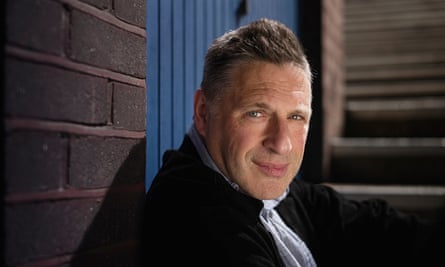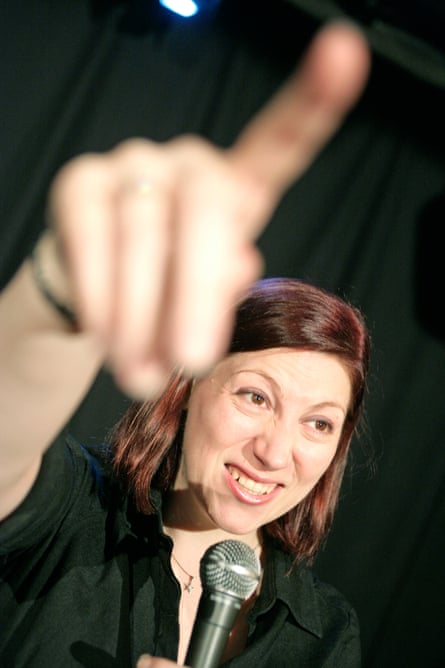‘Comedy’s a joke,” growls Hannah Gadsby, moments into her new show, Nanette. “There’s only so long I can pretend not to be serious.” Nanette has already won the Barry award at Melbourne International Comedy festival and is among the favourites to bag Edinburgh’s top prize, too. So why has Gadsby announced that it is to be her last ever standup show?
After 10 years as a comic, she says, she has grown frustrated with what she believes the artform can’t do – and her experience isn’t unique. Others have quit standup at the top of their game: Lee Evans is a recent example; Emma Thompson a more distant one. So are comedians uniquely subject to burnout? Is a certain kind of creative frustration in the artform’s DNA?
That’s only part of the picture with Gadsby, whose rejection of standup is bound up with wider political and personal issues. Now 39, she grew up in Tasmania, where homosexuality was criminalised until 1997. Her standup career, she says, was founded on defence mechanisms she deployed when young and, throughout it, she has cracked jokes about her experiences of homophobia. With Nanette, she draws a line under that. No more pretending that queer-bashing is funny. No more defusing tension to put an audience at ease.
The show she has built around these new principles is an extraordinary, confrontational one, which makes life as uneasy for its audience as possible. It’s surprising to hear, then, that the “quitting standup” conceit that frames it started out as fiction, a theatrical device. “It was in the show,” says Gadsby, “because it gave me the permission to say whatever I want, to appear unworried about my career or my reputation. But before too long, it started to sound like a really good idea. And I went: actually, I don’t think performing standup is a healthy thing for me to do.”
It’s not that Gadbsy got tired of being funny. It’s that: “I don’t think comedy is a very sophisticated form. The obligation to get that laugh – for that to be the reason to speak in the first place – often means that you don’t tell a whole story. Because there are things that you have to cull.” Her show is about the power of stories and how, if the stories we tell ourselves are simplified or smoothed over, we leave unchallenged the wider stories society tells itself (in this case, about gender, sexuality and power).

On a more personal level, Gadsby also felt her sense of self contaminated by the need to be upbeat and to self-deprecate. “The way I addressed stuff on stage was becoming my identity,” she says. “It starts to frame how you see the world, and you don’t want to frame how you are in the world around a performance, because that’s weird.” Other ex-standups I speak to feel similarly about that forced good cheer – even in the teeth of your own misery. Patrick Marber is now an eminent playwright and director, but he used to be a jobbing standup. “On a night when I was feeling down in the dumps,” he says, “to go on stage and have to be upbeat, I found very difficult. I thought a lifetime of that would be very depressing.”
But it was less the emotional conditions than the career structure that drove Marber from standup. “I started out alongside Jo Brand, Eddie Izzard and Jack Dee,” he says. “And year after year, they would go to Edinburgh, writing longer sets until they were doing their own show for an hour. But I had no desire to extend beyond 20 minutes. I was very happy on a bill with other people, doing my little bit and getting off. I didn’t want the responsibility of doing an hour. It didn’t feel natural. It seemed like a very long time to me.”
Marber was a team player (“I’m one of a gang and I like that feeling”) in an industry that increasingly favoured individualism. “Standup is quite lonely, it really is,” he says: one aspect among several of what the ex-comics I interview describe as a punishing lifestyle. For Gadsby, the locations in which standup takes place and their macho atmospheres were off-putting. “I find pubs and clubs quite difficult places to be. And always the attitude was: ‘Toughen up and get in there!’ Which I can do, but it’s not good for me.” Rose Matafeo, one of the buzziest acts on this year’s fringe, recoiled in horror when I interviewed her at the prospect of a life in standup, citing the constant battle with nerves.

Then there’s the endless travelling. “If we could cross-breed comedians with a courier company,” says Natalie Haynes, “we would absolutely own the roads.” Before she was a novelist and popular classicist, Haynes was 12 years a comic, and the first woman ever nominated for the Perrier best newcomer award on the fringe. The lifestyle ground her down but so, too, she says, did the ephemeral nature of the artform. “I wanted to make more long-lasting things. Standup for me exists only in the live environment, so it’s especially temporary. And sometimes, when you’re tired, and it has all been too difficult, looking at a great big shelf of books that you wrote – that makes you feel OK.”
The flight into novel-writing – or newspaper columns – is a common one for standups, although many manage to combine it with a comedy career. But, for Haynes, standup was all-or-nothing. “It’s hard being those two people [comic and novelist] at the same time. It’s hard to slide out of yourself and into your novel if you have the pressure of a live audience forever in front of you.” Faced with the binary choice, Haynes opted (as Gadsby would now) for the artform that didn’t oblige her to constantly be funny. “I still find it hard not to go for a gag,” she says. “But the truth is, there was a limit to what I could explore within the confines of comedy. There are other, more brilliant comedians who can do more than I did. I just wanted to write really sad books.”
No one I speak to necessarily agrees that standup is uniquely susceptible to burnout – although Haynes comes close, admitting it may be (as she resented being told at the time) “a young person’s game”. No one remotely regrets their previous lives as standups – in most cases they cite it as ideal preparation for a confident future life. Simon Fanshawe won the Perrier award in 1989, before quitting standup a few years later in favour of writing and broadcasting. “I was sitting on a train on my way to somewhere like Stoke,” he says now, “on my way to talk to a bunch of people 15 years younger than me, who had an entirely different life experience to mine. And I thought: ‘I’m not really sure this is filling me with joy.’”
Like Haynes, Fanshawe didn’t see standup as compatible with other careers. “To produce an hour’s worth of material that continues to amuse you and the audience is a process of constant invention and creation. It’s time-consuming – actually, brain-consuming – and you have to be dedicated.” But the skills he acquired have been in constant use ever since. “It’s a hell of a useful skillset, a lot more useful than my law degree.” He and his business partner now use it in corporate training. Haynes deploys it at Q&As and staged readings. According to Marber, “it taught me how to listen to an audience, to really hear, and learn the hard way that the wrong words, slightly out of order, or the wrong rhythm, kill a laugh immediately. Standup was the best education I could ever have, as a playwright, as a director.”
Gadsby still has all that to look forward to, assuming she doesn’t renege on her promise to quit. “I feel quite committed to finishing,” she says, “and also prepared for the eventuality that I might be wrong.”
“I miss it in surprising ways,” says Marber. “Sometimes I’ll have a nightmare about having to do it again. Sometimes I’ll dream of doing it. It’s still in my bloodstream, and I think it always will be.” And would he ever return to the standup stage? He pauses. “I just don’t feel brave enough any more to do it,” he says. But he sounds tempted. “I dare say that once you get there and say, ‘Good evening’, the rest follows quite naturally. It is tempting – but it’s a temptation I think I can resist.”

Comments (…)
Sign in or create your Guardian account to join the discussion